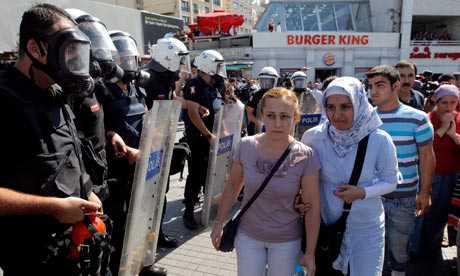Turkey’s prime minister is championing Abbas’s UN appeal – yet still has to resolve the Kurdish issue back home
Simon Tisdall · 21/09/2011 · guardian.co.uk

A Kurdish demonstration in Istanbul this month, calling for the release of the jailed PKK leader Abdullah Ocalan. Photograph: Tolga Bozoglu/EPA
Turkey’s noisy championing of Palestinian rights, a source of growing friction with the US and Israel, jars uncomfortably with Ankara’s treatment of its own disadvantaged and stateless minority – the Kurds. Bomb attacks this week in Ankara, blamed on Kurdish PKK militants, highlight the deteriorating internal security situation and stoke fears that Turkey’s troubles could spill over into Syria and Iraq, further aggravating Arab spring instability.
Apparently oblivious to possible double standards, Recep Tayyip Erdogan, Turkey’s prime minister, has been in voluble form of late. His tour last week of Egypt, Libya and Tunisia played upon a common theme – Turkey’s support for the justified aspirations of oppressed peoples everywhere. Erdogan’s long-running feud with Israel over its treatment of the Palestinians reached new heights when he warned the Turkish navy might escort future relief flotillas to Gaza.
Alarmed at the implications for US interests, Barack Obama took time at the UN in New York on Tuesday to talk Erdogan down, stressing their shared interest in peaceful, negotiated outcomes in Palestine, Syria and elsewhere. Turkey is a leading backer of President Mahmoud Abbas’s bid for UN recognition of Palestinian statehood. Obama, flanked by Israel’s Binyamin Netanyahu, desperately hopes to shove this uncomfortable issue back in the freezer.
The US also wants to head off renewed ground incursions targeting PKK bases in Iraq, as threatened last week by a senior Turkish minister, given obvious security concerns surrounding the US troop withdrawal. Rising tensions over disputed gas fields off Cyprus are adding to Washington’s worries at a time when, to put it mildly, the Greek government and its Greek Cypriot allies are not in the best shape.
Unfortunately for the majority of Turkey’s Kurds who want a peaceful settlement, one consequence of resulting American appeasement of Ankara is likely to be ever closer US co-operation with Turkey’s escalating military operations against the PKK. Like the EU, the US lists the PKK as a terrorist organisation, a categorisation passionately disputed by the main Kurdish national party, the BDP, which describes it as a “resistance” group. Washington already provides military satellite intelligence to Ankara. Now there is renewed talk of a Turkish base for US Predator drones, which the Turks want to target the PKK inside Iraq.
Erdogan has made important efforts to resolve the Kurdish issue, notably via the so-called “democratic opening” that included talks with the jailed PKK leader, Abdullah Ocalan. For their part, the PKK and Kurdish political parties have renounced their former separatist agenda. But gains have been limited, hardliners on both sides have obstructed the process, and Erdogan’s attention has shifted to the wider stage of Arab emancipation and the “re-Ottomanisation”, as some call it, of the Middle East. For him, it seems, the role of grand regional rainmaker is more alluring than that of down-home, hard-slog peacemaker.
The Kurdish parties are still trying to get his attention. The BDP’s woefully under-reported congress in Ankara earlier this month produced an eight-point protocol or “road map” for what it called a democratic resolution; and it proposed resumed talks as a matter of urgency. “All identities, cultures, languages and religions must be protected by the constitution. As a basic principle there must be a constitutional nationality that is not founded on ethnicity,” it said.
“The right to speak in the mother tongue – including in public – must be universally protected by the constitution. Education in the mother tongue language must be recognised as a fundamental right … There must be a transition to a decentralised administration. With regards to autonomy, local, provincial and regional councils must have more powers,” a BDP summary of the protocol said.
This is hardly an earth-shaking or revolutionary agenda. It is a far cry from the forfeited dream of an independent state spanning south-east Turkey, north-western Iran and parts of Syria and Iraq. And as the International Crisis Group notes in a report published this week, the acceptance of universal rights should not be regarded as a concession by the Turkish government.
The ICG report argues persuasively that the basis for a negotiated, peaceful settlement remains in place despite an upsurge in violence since June’s elections that has claimed more than 100 lives. “The PKK must immediately end its new wave of terrorist and insurgent attacks, and the Turkish authorities must control the escalation with the aim to halt all violence. A hot war and militaristic tactics did not solve the Kurdish problem in the 1990s and will not now,” the ICG says.
It continues: “The Turkish Kurd nationalist movement must firmly commit to a legal, non-violent struggle within Turkey, and its elected representatives must take up their seats in parliament, the only place to shape the country-wide reforms that can give Turkish Kurds long-denied universal rights. The Turkish authorities must implement radical judicial, social and political measures that persuade all Turkish Kurds they are fully respected citizens.”
Surely this is not so hard to do? It’s time Erdogan stopped playing Palestinian saviour and put Turkey’s problems first.

Leave a Reply